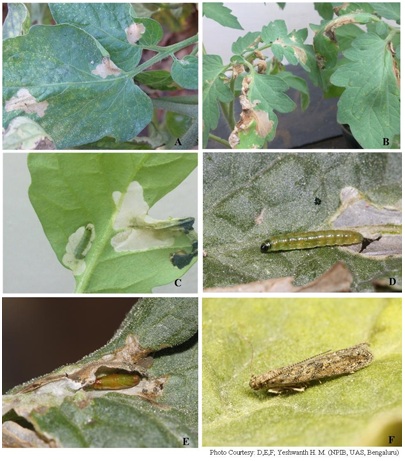Tuta absoluta: A New Invasive Pest Alert
Invasive species, alien species, exotic pests, or invasive alien species, are common names that categorize non-native animals, insects, microbes, diseases, or plants that are pests. These pests are not native in areas in which they cause problems and they are considered "invasive" because they invade and establish populations in new areas and the resulting uncontrolled population growth and spread causes economic or environmental problems. South American tomato pinworm, Tuta absoluta (Meyrick, 1917) (Lepidoptera: Gelechiidae) also known as the tomato leaf miner is one of the destructive invasive pest observed for the first time infesting tomato crop in Maharashtra, India. This pest has been classified as the most serious threat for tomato production worldwide. The pest has spread from South America to several parts of Europe, entire Africa and has now spread to India. Plants are damaged by direct feeding on leaves, stems, buds, calyces, young fruit, or ripe fruit and by the invasion of secondary pathogens which enter through the wounds made by the pest. It can cause up to 90% loss of yield and fruit quality under greenhouses and field conditions.
The pest was initially observed in Pune on tomato plants grown in polyhouse and fields during October 2014. The specimens were collected, identified and deposited at National Pusa Collection (NPC), Division of Entomology, ICAR-IARI, New Delhi by P.R. Shashank and K. Chandrashekar, ICAR-IARI scientists. Subsequently the pest was observed in the farmer’s fields in major tomato growing districts of Maharashtra viz., Pune, Ahmadnagar, Dhule, Jalgaon, Nashik, and Satara. Severe infestation (>50% plants affected) was observed in several tomato fields.
Following the reports of Maharashtra, recent surveys conducted by researchers of Network Project on Insect Biosystematics (NPIB), University of Agricultural Sciences, Bengaluru and ICAR-NBAIR, Bengaluru in January, 2015 observed the presence of this pest in Kolar and Bengaluru districts of Karnataka. The current report of T. absoluta from India is alarming because this pest is oligophagous and can attack several suitable solanaceous host plants. Present information is useful for adaptation of rapid response strategies against its invasion by educating farmers, extension entomologists and other stakeholders.
A-C: Tuta absoluta damage symptoms, mined galleries and larvae inside galleries, D: Larva; E: Pupa; F: Adult moth
